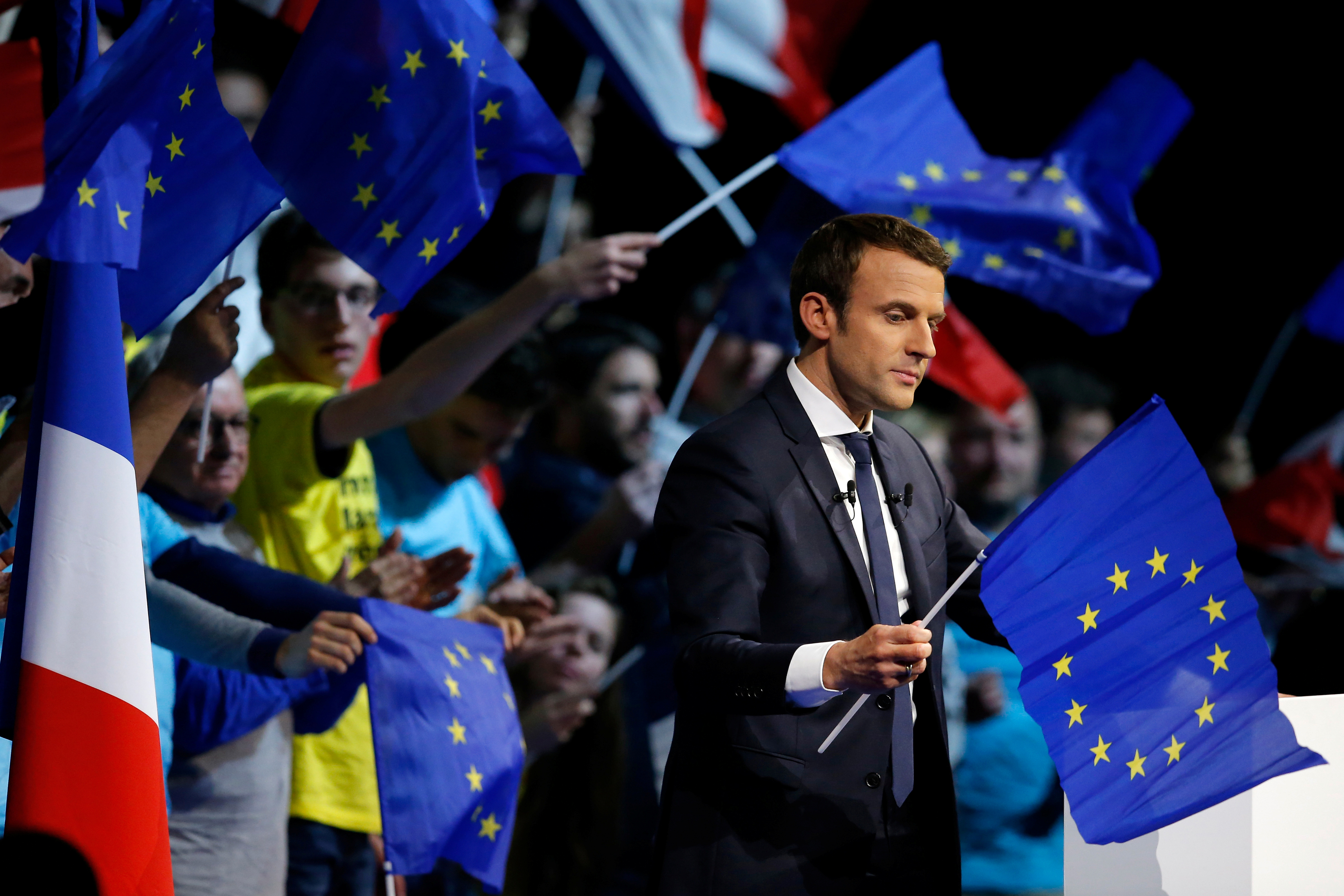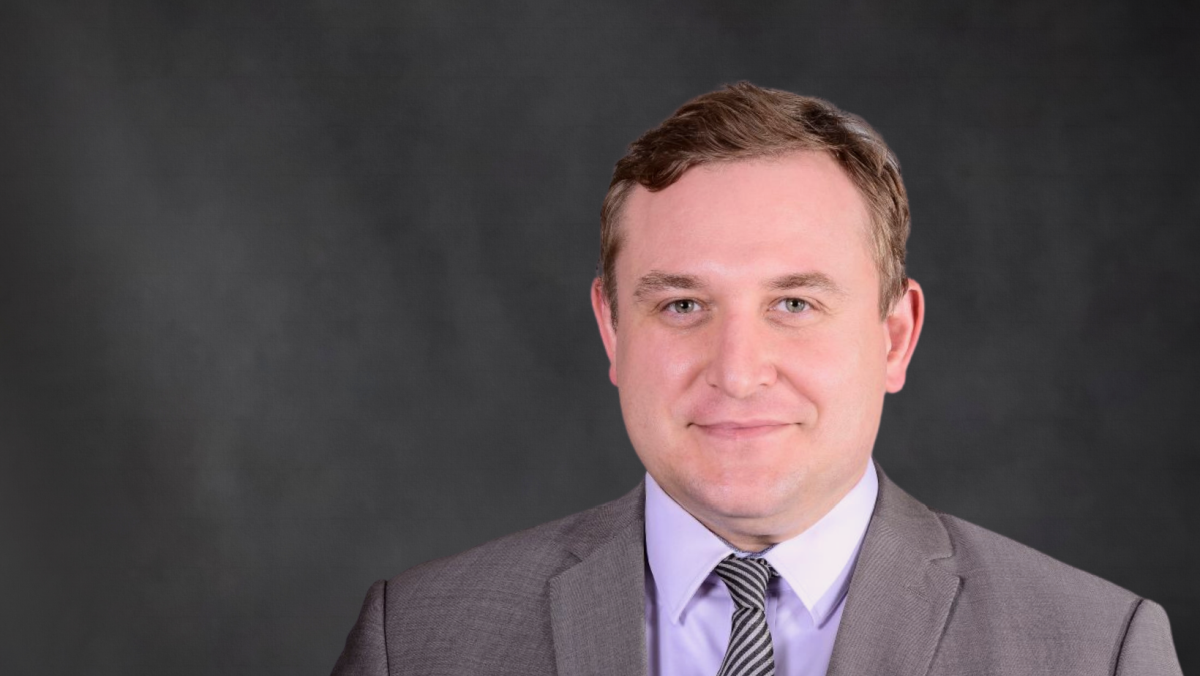French Presidential Candidate Macron’s European Policy Concept

France’s role in the EU and the vision of European integration have become central themes in the country’s presidential campaign. The most striking dispute in these areas is between Emmanuel Macron, a former minister of economy and the founder and leader of the pro-European party En Marche!, and Marine Le Pen, the leader of the Eurosceptic National Front party. According to recent polls, Macron just leads Le Pen, 24% to 23%, going into Sunday’s vote but would beat the FN leader in the second round by 61% to 39%.
Macron favours intensified EU integration in such areas as the economy and social policy, immigration and security. According to him, France should take vital actions to strengthen cooperation with Germany and—if failing to get consensus from all Member States—to shift to “multi-speed” European integration.
EU Economic Reforms
Macron’s position on the eurozone is that it should focus on further integration. He envisions the creation of a separate budget adopted by a parliament representing just the eurozone states and then managed by a new institution—an Economy and Finance Ministry of the eurozone. Access to funds from this source will depend on compliance with common fiscal, tax and social security policies (to avoid the dumping effect in the eurozone). The common budget is intended to increase the investment potential of certain regions and should offer financial support during the next economic crisis in the eurozone.
Moreover, Macron aims to strengthen cooperation among all the EU Member States by enhancing the innovation capacity of the EU economies. This is the purpose behind setting up the European Venture Capital Fund (€5 billion), mainly aimed at support for European startups. In addition, he favours establishing greater protection for European businesses in the face of stronger competition from non-European countries. The idea is to strengthen anti-dumping instruments in response to the frequent unfair competition practices from such countries as China. In this direction, Macron also backs the launch of an EU project called the “Buy European Act,” which was proposed to EU leaders in 2012 by former French President Nicolas Sarkozy. It is based on the U.S. version, the “Buy American Act,” and would establish priority access to the public market for companies that place at least half of their production in Europe.
European Security
Faced with Brexit, Russia’s expansive foreign policy, and the lack of clarity in U.S. foreign policy under President Donald Trump, Macron is promising more integration through the EU’s Common Security and Defence Policy (CSDP). Although he stated that one of CSDP’s aims is to build a European army (although he has not provided any precise plan), he said he does not intend to create European military structures that would compete with NATO.
The first step in this area would be to set up the European Defence Fund, which would finance a joint research system and the production of military equipment. The next step would be to create permanent EU General Staff. In addition, Macron calls for the establishment of a European Security Council, consisting of military members, diplomats and expert employees from Member States. Their role would be to advise European policymakers on CSDP issues. These actions are aimed at strengthening the EU’s position on the world stage.
Macron acknowledged in his campaign that another mass-migration or refugee crisis could represent a major threat to EU security. To reduce this risk, he is primarily planning to sign migration-control agreements with third countries, such as Syria, Libya and Afghanistan, and so-called transit countries like Algeria, Tunisia or Morocco. The agreements would primarily concern setting up special centres in those countries where asylum-seekers could submit applications and wait for approval before coming to the EU. In return, the Union would initiate development programmes that would enable those countries to stabilise their economic and political situations in the long term. Another Macron proposal is to strengthen protection of the Schengen Area. He wants to mobilise an additional 5,000 border guards to provide protection and control over the EU’s external borders within the framework of the European Border and Coast Guard Agency (Frontex).
Tandem with Germany
Macron aims to refresh the Franco-German “engine” of Europe, which would intensify the shift to “multi-speed” integration. The tandem could cover such sectors as the economy, security, energy, education and culture. However, Macron wants the focus to be mainly on cooperation in defence policy. He proposes the reactivation of work on the Joint Defence Council, set up in 1988 at French President-German Chancellor level. Macron envisages extending the cooperation to the Council for Defence Ministers, the ministries of Foreign Affairs and Home Affairs, and heads of General Staff. Macron’s economic reforms are also intended to give credibility to France’s role as Germany’s partner in EU leadership.
The Germans apparently support the aspirations of France’s former minister of the economy and recently gave proof of their backing on 16 March during his second official visit to Berlin. Then, he met with Germany’s highest authorities: Chancellor Angela Merkel, President Frank-Walter Steinmeier, and Foreign Minister Sigmar Gabriel. Meetings at such a high level provided support not only for assumptions of the renewal of the Franco-German “engine” of the EU but also were important for strictly campaign purposes. The 39-year-old Macron is particularly keen to promote an image of himself as a serious, mature policymaker that is recognisable internationally. Furthermore, his position has been reinforced by the positive opinion of him in German society. Germans appreciate Macron’s drive to reform France and his pro-democracy and pro-European views. He seems to be respected in Germany as the only candidate most likely to prevent Le Pen’s takeover of power.
Conclusions
Macron favours further European integration through the “multi-speed” Europe concept. According to him, not only does this pathway prevent the possibility of the disintegration of the EU but also enables a strengthened, united Europe by upgrading its capacity to manage financial, mass-migration or military crises.
The EU reform concept proposed in Macron’s electoral programme correspond to the mainstream debate on the future of European integration, intensively taking place among European leaders. This debate accelerated on 1 March with President Jean-Claude Juncker’s presentation of a white paper with assumptions on possible directions for EU development. The first reactions of Western European politicians indicated that the “multi-speed” scenario is the most preferred.[1] The EU Rome Declaration that followed states: “we will act together, at different paces and intensity where necessary, while moving in the same direction.” Additional importance was given to this concept at the March meeting in Versailles, where the leaders of France, Germany, Italy and Spain also voted for a European Union of various integration speeds.
Macron’s programme gives him a strong position to not only join these initiatives and discussions, but to play a leading role in them. His lack of experience could even be an asset because his victory would be proof of the emergence of a new generation of European politicians. France could then count on regaining its leading role in EU reforms as well as balancing Germany’s current dominance over EU matters in the past decade.
[1] P. Toporowski, J. Szymańska, “EU at a Crossroads: European Commission Lays out 5 Scenarios for the Union’s Future,” PISM Bulletin, no. 23 (963), 6 March 2017.


